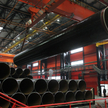One of these fuels will be a gas with a similar chemical composition to the one which flows in our pipes, but will be obtained from biomass, it will be biomethane. The potential for the development of this market segment in Poland is massive. According to our estimates, it is between 13 and 15 billion cubic metres of biogas, of which biomethane, which could be produced, could constitute about one half, that is from 7 to 8 billion cubic metres. As PGNiG, we will want to realise a half of this potential, i.e. in ten years our production would reach about 4 billion cubic metres per year. To put that in context, this is more or less the level of our annual current natural gas production in Poland. This is the potential that has not been realised so far.
Another area that will be also in line with the Green Deal policy is hydrogen. It is said to be the fuel of the future. These are the technologies for which the European Union has very high hopes and intends to allocate significant resources to their development. We also want to build a strong position in this area. This is because hydrogen can be used not only in transport, but it can also be injected into the network as a mixture with natural gas. I think this is what awaits us in the coming years. It is also a great opportunity for the development of our company. We will also want to become more active on the RES market, in wind and photovoltaic power generation. Why? Because, for instance, surplus electricity can be used to produce hydrogen. But also because such plants are very often built as supplementary systems at biomethane plants, whose nationwide development we intend to support. This is a great opportunity for sustainable development of Poland, because biomethane plants are built in locations where biomass is available. We estimate that in Poland, in order to achieve this goal, we would need about 1,500 to 2,000 such biomethane plants, so a plant would be built in practically every gmina.
This means considerable investments. What scale would it be?
According to our preliminary estimates about PLN 70 billion will have to be invested in the biomethane program. But we do not want to be a sole investor, as we believe that this is a great opportunity for the development of the local economy. We want to create a system where investors can be local Polish small and medium-sized enterprises or local governments through their utility companies. We will provide the know-how and, above all, we will ensure gas offtake. And this means that, as PGNiG, we will be customers. It will be possible to obtain financing for those investors and here we definitely count on the EU funds, including grants, to support the creation of such biomethane plants. We will certainly be an investor in the case of certain plants, but we do not want it to be perceived as PGNiG's attempt at managing the whole Poland. We want to give a chance to others, we want to create conditions for the development of such plants throughout Poland.
When will it happen?
We have already started working on it. First of all, we have defined the technical parameters for the new fuel, which is biomethane, which can be used in networks. Until now, there have not been any. Secondly, at the turn of 2020 and 2021 we want to connect the first such biomethane plant to the network. We have also recently applied to the market regulator for the determination of a tariff for the new fuel.


















